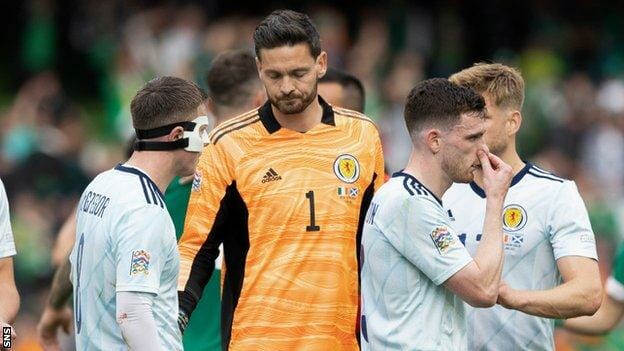

In the space of 10 days Scotland have gone from buoyant belief for the World Cup play-offs to crestfallen soul-searching after a dismal defeat in Dublin.
Captain Andy Robertson said the play-off against Ukraine passed the team by, and then confessed they let their manager down in the bruising 3-0 humbling by the Republic of Ireland. It was a damning indictment of their performances.
So why have a team who were eight unbeaten heading into this window unravelled?
The Tierney problem
Manager Steve Clarke has said himself the turning point of his time in charge came when he worked out the 3-4-2-1 formation after the 4-0 defeat by Russia in October 2019.
Switching to it allowed him to get Kieran Tierney and Robertson in the same team, with the former playing as a dynamic, marauding left centre-back.
When the Arsenal defender plays, he drives from deep and commits defenders, passes through the lines, and combines brilliantly with his Liverpool counterpart to get crosses in to the box.
His absence through injury has been glaring in this international window, with Robertson starting deeper and unable to overlap Tierney in the same manner as he does for Liverpool.
It’s clear this has an effect on Scotland’s productivity, and results. The nation have only lost four of the 20 games Tierney has played since Clarke took charge, and they have lost seven of the 15 games he has missed.


Key players tired and out of form
After a long season, some of Scotland’s marquee players looked leggy in Dublin, and many of them have not come off the back of stellar club seasons.
The Ireland defeat was Robertson’s 58th game of the campaign after Liverpool played every club game they could have this term, and the captain failed to get up and down in his usual manner.
Callum McGregor has played even more club minutes, and is another to have started all three matches for Scotland.
Scott McTominay has been part of a struggling Manchester United team and toiled at centre-back against Ukraine while giving away possession 14 times in midfield against Ireland, while Grant Hanley and Billy Gilmour were part of a poor Norwich side which were relegated from the Premier League, conceding 84 goals and scoring just 23.
John McGinn has also been far from his best recently for Aston Villa, while striker Che Adams hasn’t scored since February. It’s not an ideal recipe for a small nation when the spine of your team is out of form.
Clarke is well known for his loyalty to players who have served him well, though, and is never likely to drop them easily.
“I’m not going to criticise this group of players,” the Scotland boss said. “Sometimes you have bad days.
“Unfortunately, we’ve had two bad days in quick succession. We have to learn to deal with that and move on.”
Time for Plan B?
So what will Clarke have learned from the two defeats? Given the absence of Tierney and the lack of form of key players, Scotland perhaps needed a Plan B to try and find different solutions.
The 3-4-1-2 was brought in to toughen up the defence and accommodate Tierney and Robertson and worked. But suddenly Scotland have conceded three goals to both Ukraine and the Republic of Ireland.
On top of that, no forward players have scored for the national team in 2022.
Some pundits were critical of Clarke for taking until the 50th minute against Ukraine – when Scotland were 2-0 down – to change shape to a back four, when they improved and managed to score and looked more fluid.
Despite that, the manager reverted back to the original formation for the win against Armenia, where it worked effectively enough to secure a 2-0 win, and then again in Dublin.
Clarke will believe they can recapture their best form using the well worn-in shape, but at the moment it is not producing fluid football, with Scotland registering only 0.79 expected goals in the Aviva Stadium, and 1.29 against Ukraine.
The question is whether he will make major changes for crucial trip to Armenia on Tuesday.
“You really can’t contemplate a defeat in Armenia and still be positive about our hopes of doing anything in the Nations League,” former Scotland defender Willie Miller said on BBC Scotland’s Sportsound programme.
“We were outplayed against Ukraine and there were technical aspects of that game that should have been sorted earlier.
“I don’t think the technical aspects of this game made any difference, we were just out fought. For some reason there was a group lethargy that came out in Dublin and they were well beaten.”






